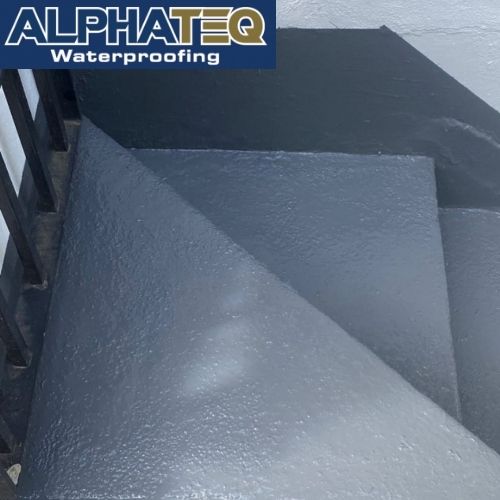I agree Our site saves small pieces of text information (cookies) on your device in order to deliver better content and for statistical purposes. You can disable the usage of cookies by changing the settings of your browser. By browsing our website without changing the browser settings you grant us permission to store that information on your device.

With the increase in higher rise buildings being constructed, stairwells and steps are increasingly part of any design. It is important that these areas are protected as much as possible. Ultimately the area needs to be waterproofed to provide protection to areas below.
These areas should be waterproofed to protect and preserve the areas underneath. Often these are living areas nearby that can be affected by travelling water ingress. These areas do need to be waterproofed as many in modern buildings are above or near occupied property.
There are many ways to provide a waterproof protection on steps and stairwells. In the past these include often involved asphalt, but nowadays more commonly, liquid in PU or PMMA form. The installation is faster and provides a seam free, flame free solution. The easiest and fastest way to waterproof a step or stairwell area is coating with a liquid.
All substrates are different. Most would require a primer to ensure that the area is able to accept a coating more efficiently. Various primers are available for the surface variations. All substrates, be new or refurbished need to have any cracks and damage repaired prior to coating taking place.
Having no seams, liquid waterproofing is less liable to failure. Awkward details are more easily dealt with, and repairs are easily carried out. It is also a faster and cheaper installation than asphalt, for example. Liquid is safer as it is flame free and the better quality systems can provide Brooft4 accreditation, which means that they are designed NOT to support fire spread (Grenfell disaster).
Obviously, this depends on usage. It is also dependent on the amount of liquid applied in the installation process. It is the thickness of the membrane that more often than not dictates the longevity of the system. A weight of 2kg/m2 is considered adequate for a twenty year or longer warranty. Typical requirements are for twenty years, but twenty-five year warranties are available. But shorter term, a ten-year system may be requested. This would typically be applied around 1.2kg/m2. Adding anti slip material is always a good idea.
Materials guarantee is one such offer where the product is backed, normally by BBA, to last a set time in normal usage.
The other more involved option is the insurance backed guarantee (IBG) which offers a materials and labour warranty. There is normally an added cost for this.
There should be a maintenance program in place where the substrate is inspected every six months for cracks developing and other damage. If carried out these inspections are very cost effective as prevention is always better than cure. Picking up problems early on can prove to save a lot of money as it stops small issues becoming major ones.
Liquid coated steps and stairwells are easy to fix. Typically, simply clean and abrade the damaged area and prime. Then apply a generous coat of liquid onto the damaged area. The primer stops any reaction between the systems if they differ. If cracks have got beyond 3mm then seal with a compatible sealant or screed prior to re-coating the damaged area.
Any membrane that can cure around the 30/45-minute time period is ideal. This could be a PMMA (strong odour is a downside) or a quality PU liquid normally with the addition of a catalyst. BBA is a good indicator, although many systems are proven to be suitable without this accreditation. Always trial the product by carrying out a peel test in a small area beforehand.
Based on a twenty/twenty-five-year system an expected price bracket is between £45/£65m2. This also depends on if anti slip is required or specific colour finishes are required. Alphateq products are high quality but are very competitive price wise. They are fast to install, thus causing minimum disruption to the area, normally communal walkway areas. The Alphateq PU system also does NOT have a strong odour and therefore impacts less than PMMA for example.
By far the easiest, fastest, most successful, and therefore cost-effective waterproofing to put onto steps and stairwells is a waterproofing liquid. It provides a seam free, damage resistant solution and ensures a vital part of the building, entry and access can function correctly without issues like water ingress impacting on the residents who live there.